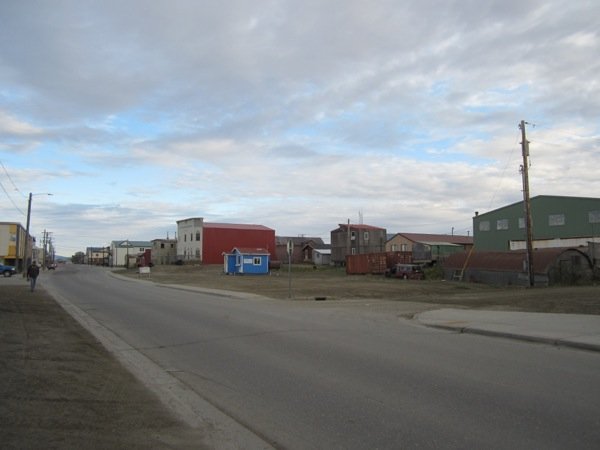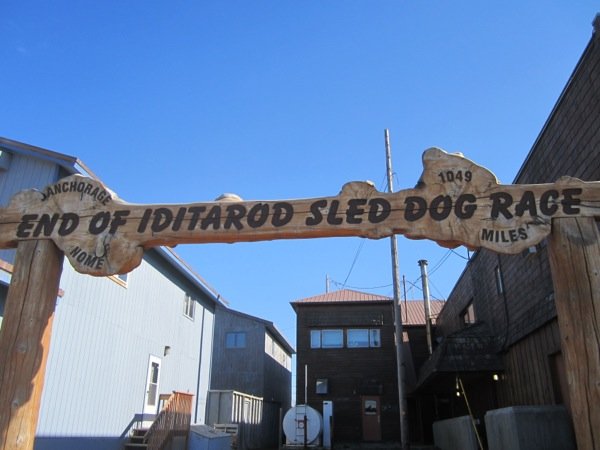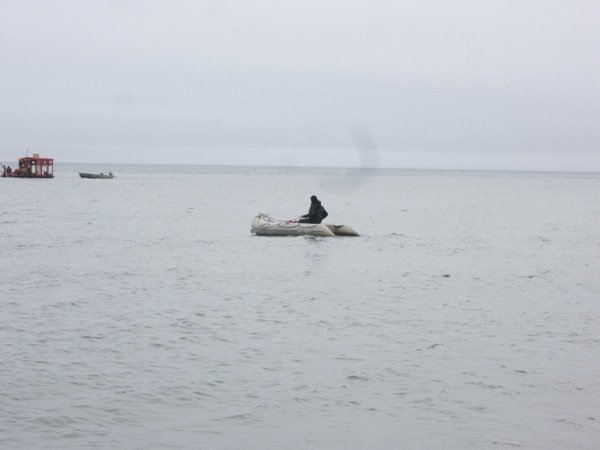Nome



Usually when I travel I contemplate: could I live here. Most of the time I conclude yes, and often fantasize the different life I would have if I moved to Wyoming, returned to Tucson, set out for northern Maine. But on this trip I have not imagined living in these isolated Alaskan towns. I feel the shadow of winter even amidst the spring abundance and the long days of sunshine.
The other day I stepped into a tiny gift shop in Nome. A young blond woman greeted us, and like most conversations in Alaska began with where we are from, why we are here. I quickly turn the questions around, more curious about why someone lives in Nome. She moved here from Utah with her husband, who is originally from Anchorage. They thought they would come for just a few years, but have had two children and plan on staying. "I love it here," she said, as radiant as the sun itself. She loves the pace of life, so much slower than Utah. She loves how neighborly people are, helping out in any situation.
I have not gotten a feel for this town at all as we drop into our hotel late--around 9 at night, under a high sun--eat, and fall asleep only to head out early the next morning in search of more birds. The hotel we are staying in could be a hotel anywhere in the world. Perhaps the only difference is that an animal channel runs continuously in the lobby on a large TV, not the news or a basketball game. And those who clean the rooms in the morning are all men, from a range of places (many Asian, some Native). One tells me he moved here two years ago for work after years of unemployment in Los Angeles.
Our group has stuck to eating at three locations: a place with a very un-appetizing name, Airport Pizza, that actually has fairly good food; Milanos, which serves both pizza and sushi (I can't bring myself to order sushi at a place called Milanos), where the server is Korean; and Subway. Until a week ago I had never eaten at a Subway; now I can say that I've eaten lunch from there every day for a week. Some days I've had breakfast there as well. And though it may seem like I'm complaining, I'm actually grateful that we are not eating at the place that advertises BBQ Chinese.
It is strange to be such a distant tourist; usually I get my hands dirty exploring back alleyways and talking to locals in cafes (or in this case, bars). But we've stayed together as a group, pointing our lens out to the birds we've come to see.
Still, as I've walked through town I've noted the bust of Amundsen. I know Amundsen from his South Pole feats (that is, first to the Pole), but now know that he flew over the North Pole in 1925. I have noted the plaque that celebrates that Wyatt Earp came, established a saloon, and left town with $80,000 in 1901. And, of course, Nome is the end of the Iditarod, the annual dog-sled race that commemorates that moment in 1925 when sled dogs brought serum from Anchorage for the diphtheria that was killing off the city. Imagining the winter here I have even more respect for those mushers.
Nome is a gold town. In 1899 three Swedes discovered gold and a year later the population hit 12, 500. There were bars and saloons and a good Red Light District. In this sense, Nome is a Western town with wide, empty streets and a love of its rough past. The air after rain smells like the desert, not mesquite, but the smell that comes when rain hits dust.
In Nome, people are still searching for gold off shore. Within sight of town are several dredges working the bottom of the Bering Sea. When I walked out the beach the other day, black sand under my boots, the cold of the water licking my cheeks, I saw a young man launching his inflated boat to return to his dredge. "Do you need help?" I asked. He shook his head no, timed his launch to the wavelets and pushed off, only getting his boots a little wet. As he rowed his dinghy toward the dredge, the Bering Sea looked vast and cold. Finding gold has never been easy business. Our group leader ran into a man at the gas pump filling five containers with gas to run his dredge. "I do this every day," he said. With gas at $5.95 a gallon, finding gold isn't cheap either. But we're all looking for gold in one way or another and as we know, the hunt is never cheap.
I walked a bit further and a young man caught up with me, wearing but a long-sleeved shirt while I had on three layers of clothing. He had two corgis bounding about with him, both black and white. They trotted up to me, joyous in the wind. "How do those dogs do in the winter?" I asked. Clearly I am obsessed with how someone gets through a winter out here--including the dogs. He hesitated a moment. "They look like porpoises bounding through the waves, only its snow," he said. And with that image, I turned around and headed back to the hotel.
Photos above: Main Street Nome; The end of the Iditarod; Young man heading toward his gold dredge in the Bering Sea